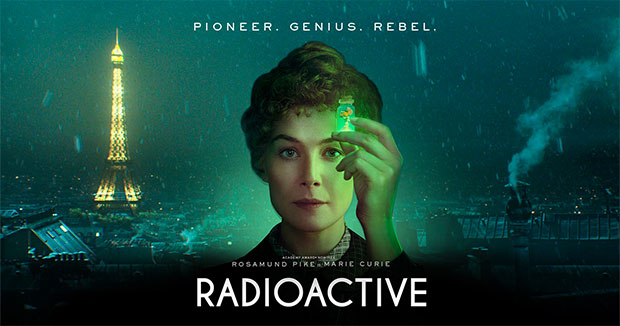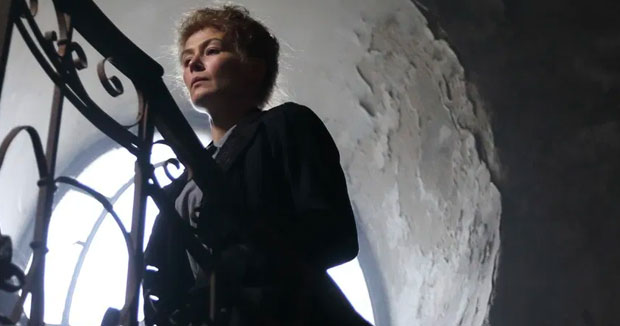Ever since her breakout role in Gone Girl, Rosamund Pike has become an even more compelling performer who often portrays brilliant real-life heroines. A couple of years ago, I thought her performance in A Private War as fearless war-correspondence Marie Colvin. Well, she plays yet another Marie in this film, Marie Curie, the Polish-born Nobel Prize-winning scientist whose inventions changed the world.
Directed by Iranian-born French filmmaker Marjane Satrapi, the biographical drama focuses on Marie’s struggle to work as a scientist, largely due to her gender, and how she eventually prevailed to win the Nobel prize. The story is told in flashback from the time Marie was in her mid 60s (Pike in heavy makeup) and she collapsed in her Paris laboratory. Most of the story takes place in Paris when Marie was studying at University of Paris and having trouble securing the proper resources and funding for her work, that is until she meets Pierre Curie (Sam Riley). Pierre takes an immediately liking to her and offers her a partnership.
Marie and Pierre worked together and eventually they did fall in love, got married and had two children together. The film showed their relationship was a happy one initially, though of course there was always something wanting. Despite the fact that the two collaborated on their scientific research and discovery–of polonium and radium–Marie’s continually discredited for her work. Pierre was nominated for Légion d’honneur, the highest French order of merit, that he rejected for not nominating Marie. Later on, Marie was basically left out of the Nobel Prize in Physics, but Pierre insisted the two jointly share that prestigious award.
Now, while the film’s subject matter is a fascinating one, the film’s narrative style almost feels a bit stifling and lacking in energy at times. I’m not sure the surrealistic elements work in the film’s favor, though I do give the filmmaker’s points for creativity. I just wish there’s a bit more dynamic energy and sparks that would make the film more lively, though Pike’s performance remain captivating throughout. The cinematography also often appear too grim and gloomy which adds an unnecessarily bleak atmosphere.
Though I had obviously heard of Marie Curie, I did not know anything about her life What I come away from watching this biopic is just how tough and heart-wrenching her life was. Both she and Pierre were heavily exposed to toxic elements in their years of research, which naturally affected their health. Marie initially dismissed such concerns, even after more and more people die from health complications after exposure to radium.
The gender discrimination is to be expected and the film captured those moments well, as well as the times Marie was harassed by xenophobic mobs because of her Polish origins in her later years. I have to say that the scenes in third act during World War I is quite a memorable one. Marie’s daughter Irene (Anya Taylor-Joy) has become a scientist in her own right at this point, and the two of them developed a mobile radiology units that they themselves took to the field near the front lines. Apparently back then, many soldiers’ limbs were unnecessarily amputated and this x-ray machines helped save the limbs if they in fact could be saved. Apparently Marie sacrificed her own Nobel prize winning to fund this humanitarian effort to the French, though she was again, never formally recognized for her work.
Marie Curie’s story of bravery, intellect and resilience certainly deserve cinematic treatment and Pike portrays her beautifully. Despite its flaws, I’d still regard this film as a remarkable and heartfelt tribute to a singular heroine and her scientific legacy.
Have you seen RADIOACTIVE? Well, what did you think?
…









I do want to see this because of Rosamund Pike, Anya Taylor-Joy, and Marjane Satrapi.
Yes, tons of amazing talents in this film. I think you’ll enjoy this one, Steven.
I had planned on watching this when it first came on Prime then just never got around to it. I think I’ll get to it soon.
I love Sam Riley so he’s another big draw for me to see it. Hope you’ll see it soon, definitely well worth a watch!
Pingback: The Alliance Lately: Issue No. 18 – The Minnesota Film Critics Alliance
Pingback: Top 10 Films of 2020 + 15 Honorable Mentions – FlixChatter Film Blog